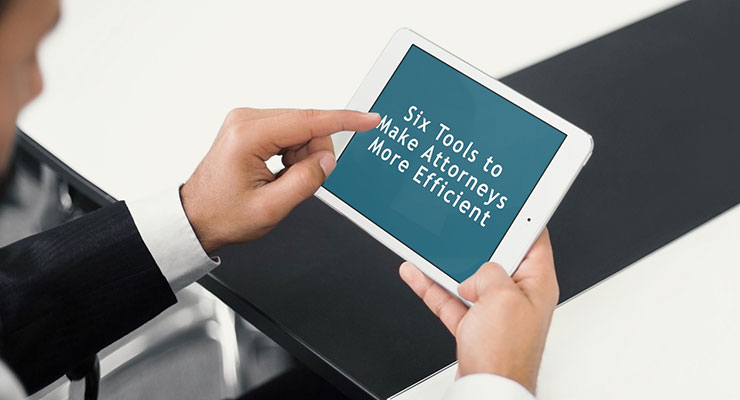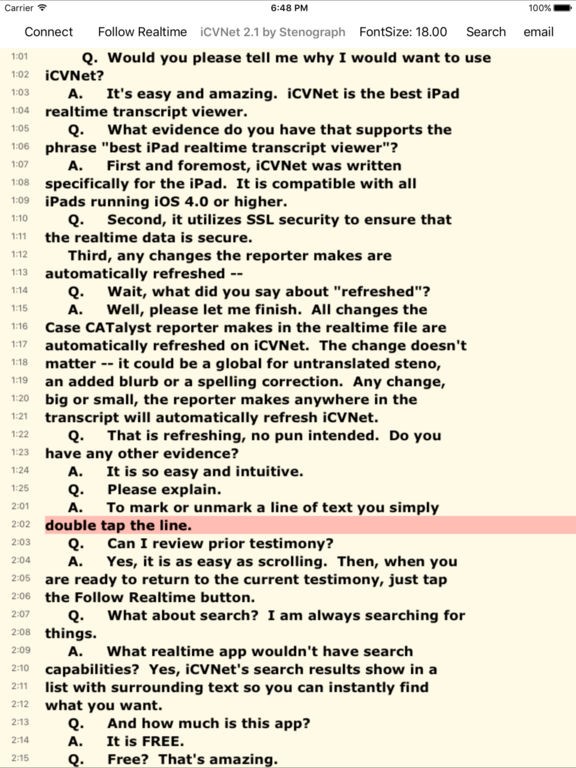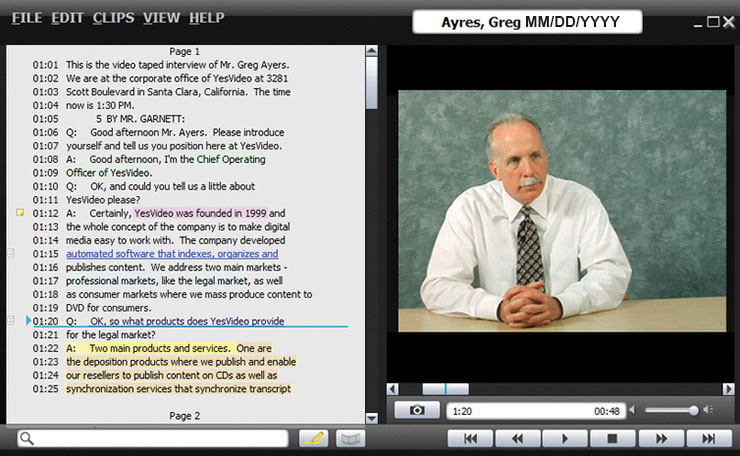
Court Reporting is a service business, period. At Mike Mobley Reporting, we are always trying to incorporate new and improved technologies to make our clients and their staff more efficient. Some of them are older technologies with a new twist, while others would be considered cutting edge in the court reporting/legal services industry. Below are some of those tools:
- Mobley DVOD (Deposition Videos on Demand) – This product is the Netflix/HBO Go of the court reporting industry. Any video that Mike Mobley Reporting produces for our clients can be uploaded to this platform and viewed by the taking attorney or their staff on any computer, tablet, iPad or mobile phone device that has internet access. Every video is secured behind 128-bit encryption accessible only to you and those you wish to share your password with. And no worries about remembering a bunch of new passwords. One password will give you access to all your videos. If additional security is needed, we can lock it down to specific locations and even limit the number of views available. None of the videos we provide through this method can be copied or downloaded. In short, your DVODs will be as secure (if not more) then physical DVDs. Of course, Mobley’s DVOD service will not totally replace traditional DVDs (yet) for video depositions. Many courthouses and other remote locations still do not have reliable internet available. For these hold outs, physical media will still be the standard order of business. But for most areas of the professional world our DVOD service will prove to be the most convenient, secure and cost effective way to review and keep track of all your video depositions. Read more about Mobley DVOD in Announcing: Mobley Deposition Videos on Demand.
- Transcript and Exhibit Repositories – With our internet repository, you have a secure way to view your transcripts and exhibits 24 hours a day, 7 days a week. Through a secure website, we can provide you with a login name and password that allows you to view and download any or all of your transcripts and exhibits from anywhere you have internet access. The Internet Repository also allows you access to check your deposition schedule, status of transcripts in progress and outstanding invoices. You can also access any cases you have been involved in since 1999. This will allow you to go back and reference any previous depositions at no additional fee.
- Digital PDF Exhibits – Scanned PDF exhibits from your court reporter save time and paper. Eventually most law firms are going to have their staff scan all the documents in a case. If your court reporter provides the exhibits and transcript in digital format at the conclusion of a trial or deposition the time and money savings can be significant.
- Traditional Videoconference and Mobile Videoconference – Sometimes there is no way for attorneys to avoid out-of-town depositions, or the travel, expenses and time away from home that comes with it. But not every deposition needs to be held face-to-face. New videoconferencing options have made videoconference depositions a close second to the in-person deposition. How? Thanks to a wide range of tools and lower overall costs compared to travel for in-person depositions, HD videoconferencing is becoming the new standard for long-distance depositions and other types of meetings. Many times, weather will prevent you from being able to conduct an in-person deposition or meeting and you need a quick back-up option. Ever had a flight cancelled because of weather and rescheduling was not a good option? We’ve seen videoconferencing help attorneys tremendously in these situations. For basic two location depositions, we have the standard videoconference setup, but what happens if there are three locations? Or four? Or maybe a co-counsel wants to attend on their phone while traveling? We can handle all that. With the proper kind of bridging service people can simply click a link and join into the conference regardless of where they are and what kind of device they are using. With a little setup, it is also possible for participants to share screens of their computers or tablets allowing easy viewing of traditional exhibits but also videos or other kinds of multimedia. This kind of technology has been available in the past, but traditionally needed advanced warning to setup everything specific to that job; however newer software allows this kind of service to be set up essentially “on the fly” with no complicated setup needed at all.
- Real-Time Reporting –
 Real-time reporting is a service by provided by the most experienced court reporters allowing the attorneys attending a court hearing or deposition to receive a real-time text feed of the witness’ live testimony on their laptop or iPad. Many court reporting firms also provide loaner laptop or iPads so their clients don’t need to load or pay for proprietary software on their firm or personal computers.
Real-time reporting is a service by provided by the most experienced court reporters allowing the attorneys attending a court hearing or deposition to receive a real-time text feed of the witness’ live testimony on their laptop or iPad. Many court reporting firms also provide loaner laptop or iPads so their clients don’t need to load or pay for proprietary software on their firm or personal computers. - Synchronized Transcript & Video – Mike Mobley Reporting’s synchronized video software allows clients to view the video footage of a proceeding while simultaneously reading the transcript on screen. Clients can search the on-screen transcript for important words and immediately see, hear, and read the relevant passages on the monitor. Combining the searchability of a transcript with the exactness of video, synchronized video allows attorneys to quickly review hours of testimony or immediately locate and present key portions of evidence at trial. The benefit of this system is that attorneys can not only read the transcript on screen while watching the deposition or trial video footage, but they can also search the video record for key words and phrases at any point. This gives them the ability to quickly find important testimony or review hours of testimony for key excerpts. At trial, a litigation team can use the system to immediately locate and play back passages of important testimony to the entire court at a moment’s notice.

Which of these six technology tools have helped you be more efficient?
If you have any questions or would like more information about these tools, give us a call at (937) 222-2259.
We recently published a comprehensive report about how video can be a great tool for attorneys in the litigation process called “Lawyer’s Guide to Legal Video: Why, What & How”. In it, we discuss 10 ways legal video assists you in depositions, trials and in your law practice. To access it, go to: http://www.mobleyreporting.com/lawyers-guide-to-video/.
ABOUT THE AUTHOR:
Todd Mobley is the president, accountant, and videographer for Mike Mobley Reporting. He has served on numerous committees of national and Ohio court reporting industry associations. Connect with him on LinkedIn.